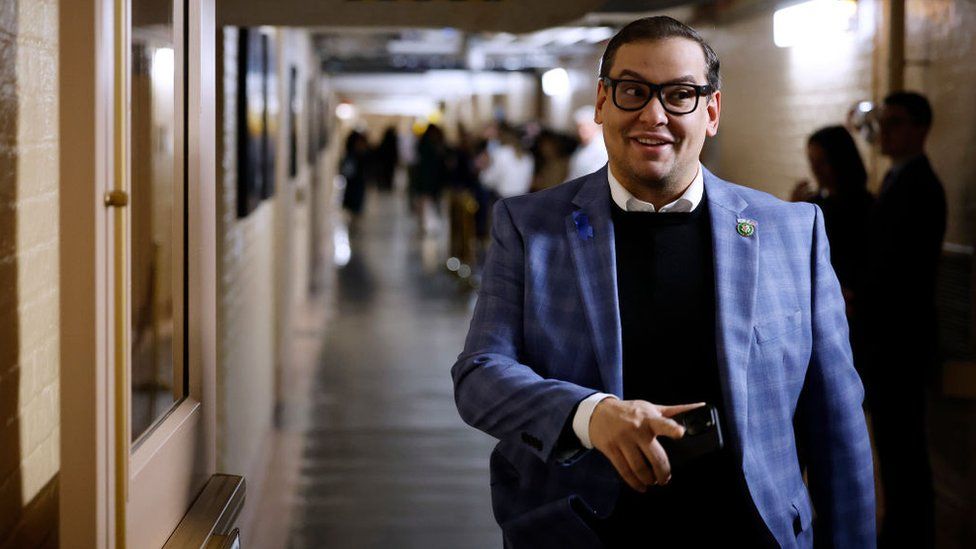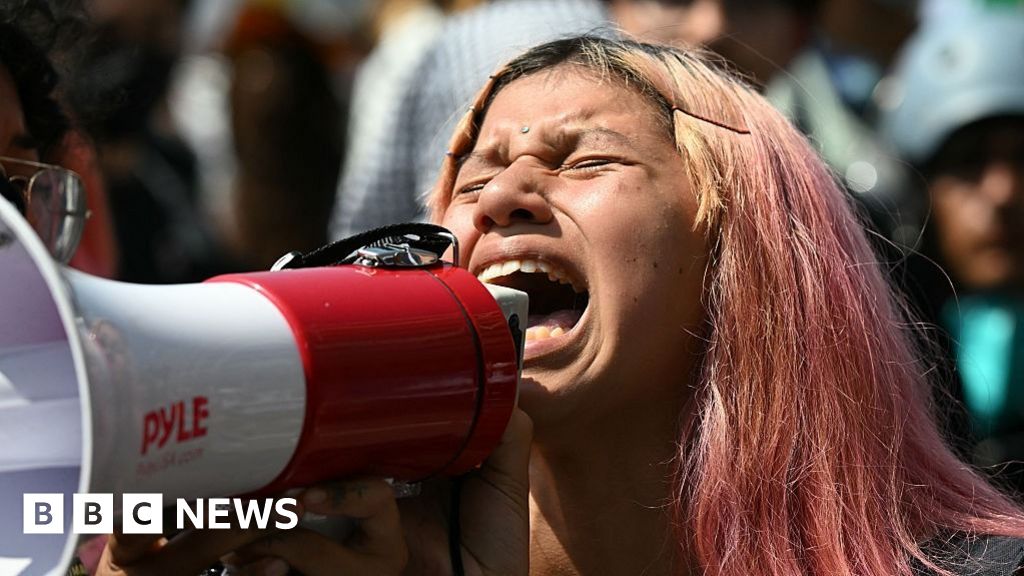ARTICLE AD BOX
 Image source, Chip Somodevilla
Image source, Chip Somodevilla
Representative George Santos faces a second effort to expel him from the House, a year after he won his seat representing a New York district.
By Anthony Zurcher
North America correspondent
Just a day after the US House of Representatives Ethics Committee issued a damning report detailing evidence of corruption and fraud by congressman George Santos, the panel's chair, Michael Guest, introduced a resolution to expel the embattled New York Republican.
If the House approves the resolution - a high bar requiring a two-thirds majority - it would be only the sixth time the lower chamber of Congress has kicked out one of its own elected members.
Then, Mr Santos would join a short list that includes politicians convicted of corruption and bribery and those who engaged in treason and treachery.
"Members of Congress are loath to go down that path," says Jason Roberts, a political science professor at the University of North Carolina. "Think about the democratic principles at play here. Constituents have decided that these individuals should represent them, and the view of most members is that voters should decide who stays or goes."
What's more, he adds, most politicians who find themselves in the kind of trouble facing Mr Santos simply resign from office before they get expelled.
The New York congressman, it seems, is unusually stubborn.
Jim Traficant: Convicted of federal crimes, he tried to return to Congress twice
Image source, Getty Images
Image caption,Former Representative Jim Traficant, speaking at a House event on IRS reform, was convicted of tax evasion.
The most recent expulsion occurred in 2002 and involved a colourful Democrat from eastern Ohio best known for his bad toupees and penchant for quoting the catchphrase "beam me up" from the Star Trek television series during congressional speeches.
Jim Traficant had been convicted earlier that year in federal court on 10 counts of bribery, tax evasion and racketeering - including requiring some members of his congressional staff to do chores around his Ohio farm and pay him monthly kickbacks from their federal salaries.
He remained defiant even as he was facing removal from Congress.
"I'll go to jail before I resign and admit to something I didn't do," he said.
The Ohio congressmen did not resign, but he was forced out by a 420-to-1 vote. And he did go to jail, serving seven years of an eight-year sentence.
A home address at the high-security US penitentiary in Allenwood, Pennsylvania, didn't end Traficant's political aspirations, however. He left the Democratic Party, registered as an independent and ran for his old congressional seat from his cell, garnering 15% of the vote in the 2002 election. After his release, he ran again as an independent in 2010, this time taking 16%. Both times, he lost to Democrat Tim Ryan.
Traficant died in a tractor accident on his farm in 2014.
Michael Myers: Took a bribe in the scandal from American Hustle
Image source, Bettmann
Image caption,Former Pennsylvania Representative Michael Myers speaks to reporters after being expelled from Congress
The only other modern House expulsion occurred in 1980, as part of the sprawling federal FBI sting operation targeting public corruption and organised crime. The episode inspired the 2013 Oscar-nominated film American Hustle.
Investigators videotaped Michael Myers, a Democratic congressman from Philadelphia, accepting a $50,000 bribe from an undercover agent posing as a representative of an Arab sheikh, who was supposedly seeking political asylum and other governmental favours in the US.
Myers, in his defence, said he was intoxicated at the time and thought the meeting was a "charade" where he would not be obligated to help the sheikh even after accepting the money.
It was an explanation neither a jury nor the congressional committee that recommended his expulsion found credible.
"This case, unfortunately, comes down to a blatant one of personal greed being allowed to overcome a representative's sworn duty, a case of trading a promise of votes and influence for money," the investigating House committee wrote in its report.
Myers was one of six congressmen ultimately convicted in the investigation. He was the only one who refused to resign. He was sentenced to three years in prison and expelled from the House by 376 to 30 votes.
It was neither his first nor last run-in with the law.
In 1979, during his time in Congress, he had accepted a plea deal to a charge of assaulting a security guard at a Washington-area hotel after being notified that a party he was hosting was too loud.
In 2022, while working as a political consultant, the now-79-year-old former congressman pleaded guilty to participating in election fraud on behalf of his Philadelphia-area clients and was sentenced to two-and-a-half years in prison.
Unlike these two politicians, Mr Santos - while under multiple felony indictments - is facing expulsion prior to a criminal conviction. Still, his situation has more in common with the modern-day corruption of Traficant and Myers than the fate that befell the three other politicians expelled from the House of Representatives.
Electoral politics is part of the reason why, says UNC Professor Roberts.
"Republicans who are pushing for Santos' expulsion, especially in New York, are worried about being dragged down with him," Prof Roberts says, adding that they are in competitive districts targeted by Democrats.
Also, unlike Traficant, who served in office for 17 years, Mr Santos is a new arrival to Congress and has not built up political alliances that could protect him.
Confederates: Remaining three sided against US in Civil War
Image source, Getty Images
Image caption,John Bullock, of Missouri, fought in a militia against Union soldiers during the Civil War
Congressmen John Reid and John Clark of Missouri and Henry Burnett of Kentucky were kicked out of Congress in 1861 for siding with the Confederacy in the US Civil War.
Reid had actually resigned earlier that year, but the House didn't seem to have been notified. Burnett worked in a provisional secessionist Kentucky state government and fought in the Confederate Army.
Clark served as a brigadier general in the Missouri State Guard, a militia that clashed with federal soldiers in the Union state. After the war, he ran for Congress once more, but lost to his son, John Clark Jr.
The three congressmen joined 14 US senators removed from the upper chamber for similar reasons. (In 1877, the Senate posthumously reversed the expulsion of Senator William Sebastian of Arkansas, after finding he did not actively support the Confederacy.)
House voted before on ousting Santos
Image source, Drew Angerer
Image caption,George Santos on a Capitol Hill elevator as the House debated an earlier measure to expel him.
The House is expected to hold a vote on Mr Santos's expulsion sometime after the chamber returns to session following next week's Thanksgiving holiday.
An earlier attempt to oust Mr Santos failed by a 179 to 213 vote - well short of the two-thirds necessary for removal. The details of the ethics report have prompted some legislators who initially did not support Mr Santos's expulsion to change their position, however.
Still, the New Yorker's situation has more in common with the modern-day corruption of Traficant and Myers than the fate that befell three other politicians expelled from the House.
If Mr Santos is formally expelled, New York would schedule a special election to fill his seat.
And, if the chequered history of politicians who received the ultimate congressional punishment is a guide, this may not be the last the US public hears of the New York congressman.

 1 year ago
57
1 year ago
57








 English (US) ·
English (US) ·